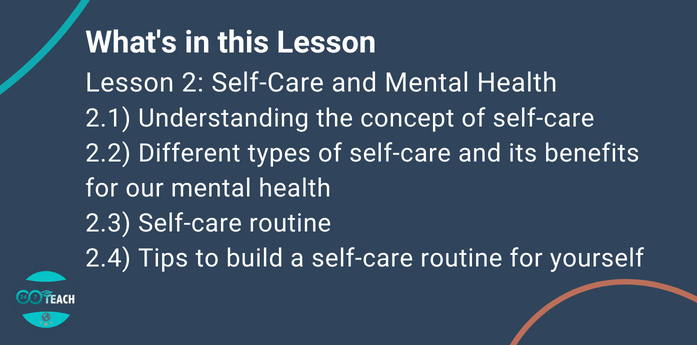Lesson 2: Self-Care and Mental Health
Prefer to listen to this lesson? Click below.
Please note that this course is designed solely for informational and motivational purposes. It is not a substitute for professional therapy or medical advice.
Workshop Scenario
Please think of yourself in the following scenario as you complete this workshop.
"Hi! Welcome again to the 24/7 Teach mental health and wellness workshop!"..."Before we start, imagine yourself in the following scenario:
Imagine you are working at a company. Working at this company has been both rewarding and challenging for you. The working environment is very fast-paced but you finished all of your projects and assignments on time despite that. But later you noticed something off with you. You suddenly started skipping deadlines and company meetings. You started to forget even minor things. When your colleague saw it, he invited you for a coffee outside the office and suggested that you take off from work and spend some time with yourself to look over your mental health.
Now, you joined this workshop to learn more about mental health and wellness to keep yourself updated about common mental health issues and the ways to avoid these.
In the previous lesson, you get introduced to the concept of mental health and well-being and some common mental health conditions. In this lesson, you will learn about the concept of self-care, its types, and some tips to build your self-care routine that will benefit your mental health and well-being.
Your objective for today is:
Learners will explore different types of self-care techniques and strategies and will use these to build a personal self-care routine for themselves.
Important Questions to Consider While Reading:
In order to be successful in this lesson, you must be able to answer these important questions.
Why self-care is important for maintaining good mental health and well-being?
How to create the best self-care routine that will positively contribute towards your mental health and well-being?
2.1) Understanding the concept of self-care
Self-care in the context of mental health is about nurturing our emotional well-being with kindness and compassion. It's like giving ourselves a warm embrace during challenging times and celebrating the moments that bring us joy. Just as we take care of our physical health, self-care acknowledges the importance of tending to our mental and emotional needs. It's about finding little pockets of peace in our busy lives, where we can take a deep breath and let go of stress. Engaging in self-care means recognizing that we are deserving of love and understanding, even from ourselves. It involves making time for activities that make our souls sing, whether it's painting, dancing, or simply taking a peaceful stroll in nature. Building healthy boundaries and knowing when to say "no" becomes a way of protecting our hearts and preserving our emotional energy. And when life feels overwhelming, self-care reminds us that it's okay to ask for help, to reach out to friends or professionals who will lend a listening ear and provide support without judgment.
By practicing self-care, we empower ourselves to navigate life's ups and downs with resilience and a sense of balance, knowing that we are worth the care and attention we give to our own hearts.
2.2) Different types of self-care and its benefits for our mental health
Let's explore different types of self-care and how they can positively impact our mental health:
Physical Self-Care: Taking care of your body is like giving it a warm hug. When you move your body, whether through dancing, walking in nature, or stretching with yoga, you release those happy chemicals that lift your spirits. And don't forget to feed your body with nourishing foods and get enough restful sleep. It's like giving yourself a boost of energy and strength to face the day ahead.
Emotional Self-Care: Embracing your emotions is like embracing a dear friend. Writing in a journal or sharing your feelings with someone you trust can help you sort through your emotions and feel lighter inside. You could also express yourself creatively through art or music, like pouring your heart out on a canvas or singing your soul into a melody. It's like giving yourself a safe space to heal and grow emotionally.
Social Self-Care: Connecting with others is like wrapping yourself in a warm blanket of love and support. Spending time with loved ones, laughing together, and sharing life's ups and downs make you feel less alone and more understood. Being there for each other, like a circle of friends holding hands, provides comfort during difficult moments and fills your heart with joy during happy ones.
Intellectual Self-Care: Nourishing your mind is like giving it a playful playground to explore. Reading books, learning new skills, and engaging your mind in puzzles or hobbies keep your brain sharp and curious. It's like giving yourself a never-ending adventure of growth and discovery.
Spiritual Self-Care: Connecting with your inner self is like feeling the warm rays of the sun on your face. Practicing mindfulness or spending time in nature lets you breathe and find peace within. It's like giving yourself a moment to reflect and find serenity amidst life's busyness.
Environmental Self-Care: Creating a comforting space is like building a cozy nest for your soul. Decluttering and organizing your surroundings, surrounding yourself with things you love, and immersing yourself in nature all provide a sense of tranquility and renewal. It's like giving yourself a haven where you feel safe and at ease.
Practical Self-Care: Taking care of your daily needs is like showing yourself love in action. Setting boundaries, managing time wisely, and asking for help when needed to protect you from overwhelm and stress. It's like giving yourself the gift of balance and empowerment.
Remember, self-care is a gentle act of kindness to yourself. You are worthy of love, understanding, and care, just as you would cherish a cherished friend. By embracing different forms of self-care, you can create a beautiful symphony of well-being in your life, where your mental health flourishes and your heart finds harmony.
2.3) Self-care routine
A self-care routine is a set of intentional practices and activities that individuals regularly engage in to nurture their physical, emotional, and mental well-being. It's like having a personal toolkit filled with activities that help you recharge and maintain a sense of balance amidst life's demands. A self-care routine is unique to each person, tailored to their needs, preferences, and lifestyle. The goal is to prioritize self-care as a vital part of daily life to promote overall health and happiness.
2.4) Tips to build a self care routine for yourself
Creating a self-care routine to maintain good mental health involves intention, consistency, and kindness to yourself. Here are some tips to help you build an effective self-care routine:
Start Small: Begin by incorporating a few simple self-care activities into your daily routine. It could be as basic as taking a few minutes each morning for deep breathing or setting aside time to engage in a hobby you enjoy.
Identify What Works for You: Reflect on activities that bring you joy, relaxation, and a sense of peace. Everyone's self-care routine is unique, so choose practices that resonate with you and align with your preferences and needs.
Be Consistent: Consistency is key to making self-care a habit. Set aside specific times each day or week for self-care activities, and prioritize them as you would with any other important commitment.
Schedule Self-Care: Put self-care on your calendar or set reminders on your phone to ensure you make time for it. Treat self-care as an essential appointment with yourself that you can't miss.
Mix and Match: Vary your self-care activities to keep things interesting and prevent burnout. Balance activities that nourish your body, mind, and soul, such as exercise, meditation, creative pursuits, and social interactions.
Be Flexible: Life can get busy and unpredictable, so be flexible with your self-care routine. If you miss a session, don't be too hard on yourself. Simply adjust and continue the next day.
Set Boundaries: Learn to say "no" to commitments or activities that drain your energy and time, and prioritize self-care without feeling guilty.
Practice Mindfulness: Be present and fully engage in your self-care activities. Mindful self-care allows you to savor the moment and experience the benefits more deeply.
Closing Assessment:
Select the Assessment button below to answer the following questions:
Develop a concise self-care plan focused on enhancing your mental health and well-being.
Identify two specific activities or strategies that you would incorporate into your plan to promote better mental health.
Explain why you believe these activities are essential for maintaining your mental well-being and how they can positively impact your overall quality of life.
Discussion Question:
1. Please answer the following question in the comment section below and interact with learners from around the world.
Discuss the potential long-term benefits of consistently incorporating self-care into daily life for mental well-being.
What are some common barriers that prevent individuals from prioritizing self-care? Explain why.
2. Please read and reply to other learners’ answers in the forum. Your replies should offer new substantiated ideas or thoughtful questions.








